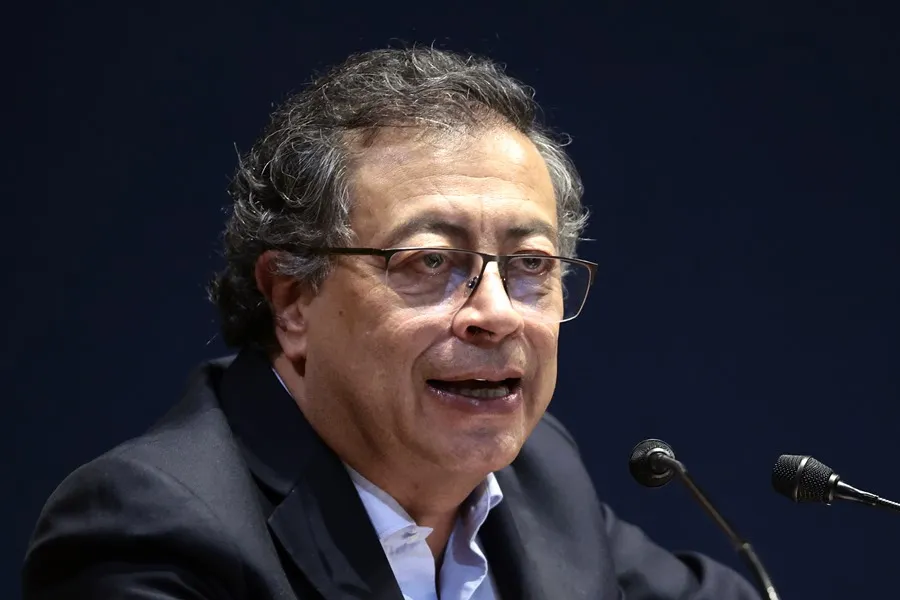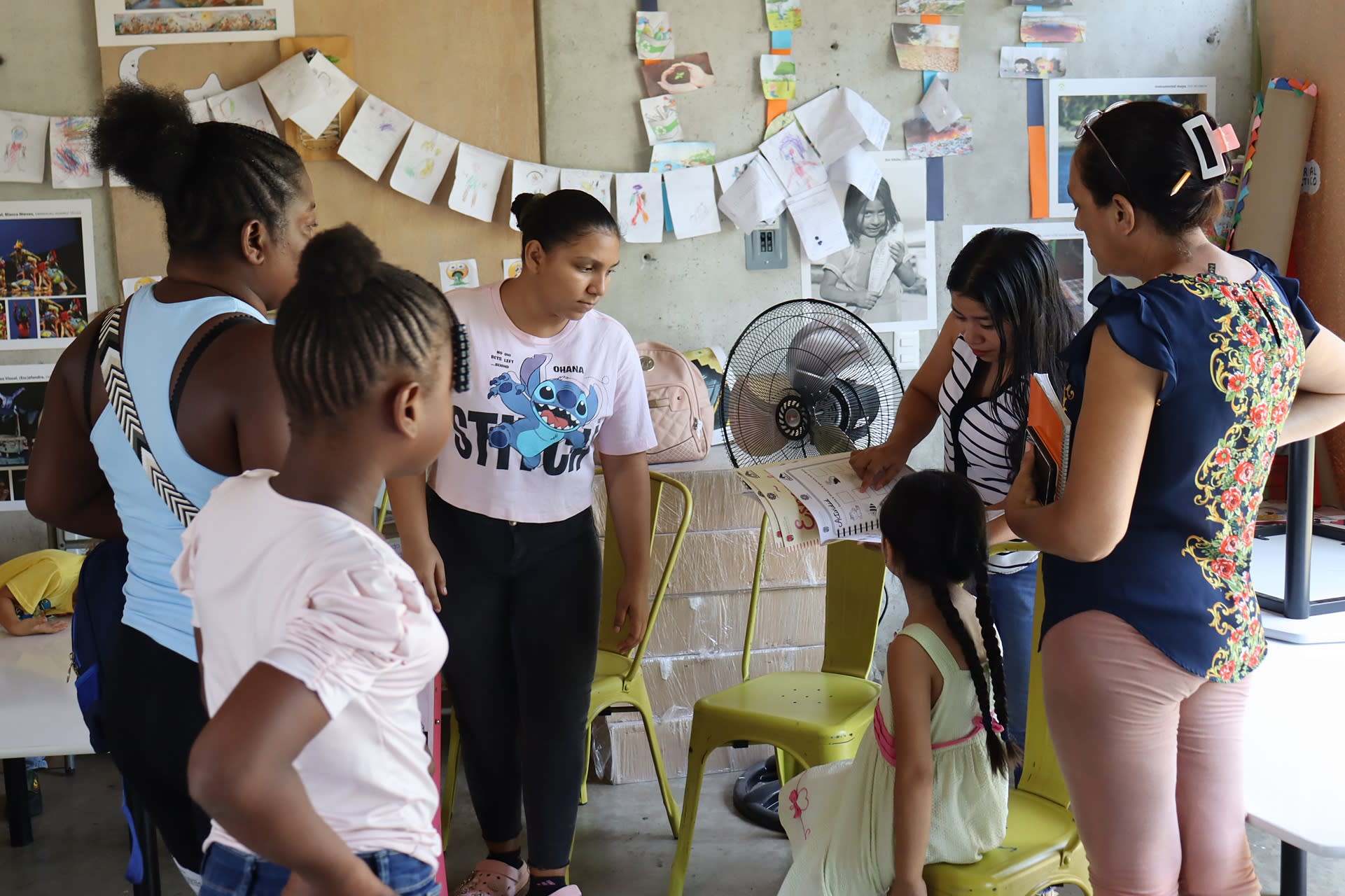International
Petro says he is dealing with Maduro with a plan to “eradicate” armed groups from the border

The president of Colombia, Gustavo Petro, said on Thursday that he has been in contact with Nicolás Maduro to launch an action plan that would allow the “eradication” of armed groups from the border with Venezuela, following the clashes in the Catatumbo area between the guerrillas of the National Liberation Army (ELN) and a dissident of the FARC.
“I have talked to the president in Venezuela, Nicolás Maduro, to cover up the illegal passages, especially in the Catatumbo River, and it is acted with flights from side to side, we verify (sic) with the presence of 1,580 compatriots in a refugee camp on the other side,” Petro said in his social network account X.
He also said that “an action plan is being built, a set that seeks to close all space for action of the owners of drug trafficking on the border.”
The president thus responded to criticism the day before for making an official trip to Haiti while the country faces the security and humanitarian crisis caused by the clashes in the Catatumbo, which began a week ago and left between 60 and 80 dead, according to different authorities, as well as some 36,000 displaced people.
“No one disconnects at this time. I inform you that I have been connected with the current Venezuelan Government from Haiti and I have delegated my Minister of Defense to talk to his peer and establish a joint plan to eradicate armed gangs on the border,” Petro added.
Petro also said that there will be “a meeting of the two defense ministers for this purpose.”
Colombian Foreign Minister Luis Gilberto Murillo, who resigned this week and will be in office until January 31, said on Wednesday in New York that the Colombian Government has asked that of Venezuela through diplomatic channels to ensure greater control at the border to prevent the passage of ELN fighters from Catatumbo.
Murillo, who spoke before the UN Security Council at its quarterly session on the Verification Mission in Colombia, said that the two Governments “are coordinated to ensure tranquility on both sides of the border.”
To this end, he added, Colombia has “sadd to the Venezuelan State that it is definitive to avoid the passages of the members of the ELN through the border,” because it is a fact that “there were a series of illegal passages,” although all this without going to the extreme of closing the legal bridges that communicate the two countries.
Colombia and Venezuela share a border of 2,219 kilometers, of which about 375 are in the Catatumbo region, the scene of the clashes between the ELN and the 33rd Front of the FARC dissidents, for territorial control and drug trafficking businesses.
The delegation of the Government of Colombia in the dialogues with the National Liberation Army (ELN) said that the members of the guerrillas participating in the peace process are not in Cuba, after the Prosecutor’s Office reactivated the arrest warrants against 31 negotiators of the armed group.
“Our delegation affirms that to date, and according to official information, in Cuba there are no representatives or people authorized to participate in the peace process belonging to the ELN,” said this Thursday the Government delegation headed by Vera Grabe in a message on her X account.
This statement is made after the Prosecutor’s Office reactivated on Wednesday the arrest warrants against the ELN peace negotiators after Colombian President Gustavo Petro ordered the suspension of talks due to the “war crimes” that that guerrilla is committing in the Catatumbo.
Central America
Trump Administration Asks Supreme Court to Block Return of Deported Salvadoran

The Trump administration on Monday asked the U.S. Supreme Court to block a lower court order requiring the return of a Salvadoran migrant who was mistakenly sent to a maximum-security prison in El Salvador, despite having legal protection from deportation.
The U.S. government has until Monday to bring Kilmer Armado Ábrego García back to the United States, as ordered by Judge Paula Xinis in a Maryland court.
According to The Washington Post, the administration argues it lacks authority to comply because Ábrego García is currently in Salvadoran custody.
The U.S. had appealed Judge Xinis’ ruling to the Fourth Circuit Court of Appeals, but the court declined to act immediately—prompting the administration to take the case to the Supreme Court. In its filing, the government stated that “the Constitution entrusts the President, not federal district courts, with the conduct of foreign diplomacy and the protection of the nation from foreign terrorists, including through deportation.”
Ábrego García, a resident of Prince George’s County, Maryland, and married to a U.S. citizen, came under scrutiny in 2019 after an informant claimed he was a member of the MS-13 gang (Mara Salvatrucha).
Although he was initially slated for deportation, a judge later granted him a stay of removal after he requested asylum, according to the lawsuit.
Nevertheless, U.S. Immigration and Customs Enforcement (ICE) detained him on March 12, claiming his status had changed, and sent him to a detention center in Texas.
International
Teachers in Southern Mexico Bring Education to Stranded Migrant Children

Teachers in southern Mexico have created a program to provide classes for migrant children stranded in the region, following a year-over-year increase of over 70% in irregular migration among minors—many of whom lose months or even years of education during their journey toward North America.
In Tapachula, the largest Mexican city bordering Central America, three teachers offer preschool, elementary, and secondary education through the Chiapas State Migrant Education Program (Pemch).
This initiative has been replicated in key municipalities across Chiapas, including San Cristóbal de Las Casas, the capital Tuxtla Gutiérrez, Palenque, Comitán, and other border towns. Currently, there are around 1,345 migrant students and a total of 35 teachers working across farms and shelters.
Pablo Arriaga Velázquez, a teacher with the migrant education program in Tapachula, told EFE that the project was born in response to the large number of migrant minors, as enrolling them in regular schools is often difficult.
Central America
Mulino and Orsi Highlight Shared Vision After Panama Joins Mercosur as Associate State

The Presidents of Panama, José Raúl Mulino, and Uruguay, Yamandú Orsi, highlighted on Monday the path of integration both countries have undertaken in areas such as trade and the defense of democracy, following a meeting held at the Panamanian government headquarters.
In a brief statement to the press, both leaders emphasized that Panama and Uruguay share many values and are working together across different sectors. They also underlined a renewed connection following Panama’s accession last December to the Southern Common Market (Mercosur) as an Associated State.
“Panama has begun a new era of looking southward, seeking opportunities not only for work, business, and friendship, but also for regional integration in a positive sense. Today, I believe we have taken a decisive step in that direction,” said President Mulino.
The Panamanian leader stressed that his country and Uruguay “have much in common” and share “important values in terms of democracy, respect for institutions, and the rule of law—principles that must always be strengthened, no matter how much effort it takes.”
-

 Internacionales2 days ago
Internacionales2 days agoErik Prince Backs Ecuador’s Daniel Noboa in Fight Against Crime and “Narcoterrorism”
-

 Central America4 days ago
Central America4 days agoPanama’s former president Martinelli claims political enemies tried to kill him
-

 Central America2 days ago
Central America2 days agoGuatemala’s Legal Chief Shot Dead in Parking Lot: Investigation Underway
-

 International4 days ago
International4 days agoJavier Milei vows to work ‘side by side’ with the U.S. on trade rules
-

 Central America15 hours ago
Central America15 hours agoHonduras Hosts CELAC Summit Amid Regional Concern Over U.S. Deportations
-

 International15 hours ago
International15 hours agoTeachers in Southern Mexico Bring Education to Stranded Migrant Children
-

 Central America15 hours ago
Central America15 hours agoMulino and Orsi Highlight Shared Vision After Panama Joins Mercosur as Associate State
-

 Central America15 hours ago
Central America15 hours agoTrump Administration Asks Supreme Court to Block Return of Deported Salvadoran















